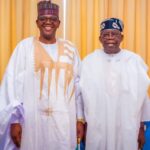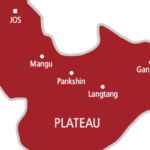Our Senior Correspondent, Abbanobi -Eku Onyekachi reports that the Nigerian Senate’s rejection of a motion to honor late Prof. Humphrey Nwosu for his contributions to democracy has ignited a firestorm of debate, criticism, and condemnation nationwide. Read the excerpts.
Despite President Bola Ahmed Tinubu’s reported support for Nwosu’s recognition, the Senate cited procedural issues and controversy surrounding Nwosu’s role in the annulled June 12, 1993 presidential election as reasons for the rejection.
With the way things stand now, one will not be far from the truth to pronounce him, “Hero of Democracy,” based on the role and risk he took at the 1993 presidential election.
The motion’s rejection has reignited discussions about Nwosu’s legacy, with some viewing him as a hero of democracy and others criticizing his involvement in the annulled election. This dichotomy raises questions about the complexities of Nwosu’s role in Nigeria’s democratic history. Notable Nigerians, including Prof. Alphonsus B. C. Nwosu, Chief Simon Okeke, Prince Orji Nwafor-Orizu, Amobi Nzelu Esq, and Prof. James Ene Wannaji, have expressed disappointment and frustration over the Senate’s decision.
Understanding Nwosu’s contributions, one wouldn’t be wrong in saying that
Prof. Nwosu played a pivotal role in Nigeria’s democratic history, overseeing the June 12, 1993, presidential election, widely regarded as the most credible election in Nigeria’s history. He introduced innovative electoral systems, such as Option A4 and the Open Ballot System, which contributed to the success of the 1993 election. His commitment to democratic principles was evident in his refusal to succumb to military pressure, showcasing his courage in the face of adversity.
Reactions from prominent Nigerians,
Prof. Alphonsus B. C. Nwosu, believes there is no justification in denying Nwosu the posthumous honor, citing his crucial role in Nigeria’s democratic history.
Chief Simon Okeke condemned the Senate’s decision as an act of injustice and an indictment on Senate President Godswill Akpabio, emphasizing the significance of acknowledging Nwosu’s contributions to Nigeria’s democratic history.
Prince Orji Nwafor-Orizu criticized the Senate’s decision, stating that Nwosu’s legacy has been relegated to a solely Igbo affair, ignoring the fact that individuals from various ethnic groups supported Nwosu’s efforts.
Similarly, Amobi Nzelu Esq criticized Senator Adams Oshomhole’s comments, seeing them as an expression of hatred towards the Igbo people, and argued that honoring Nwosu won’t alter the historical significance of the 1993 election.
However, Prof. James Ene Wannaji believes that Nwosu’s legacy serves as a poignant reminder of the impact of socio-political environments on individuals, highlighting his courage in the face of adversity.
A careful perusal at the Senate’s decision will show that there is divided opinion in the whole thing, but all the same, the Senate’s rejection of the motion has sparked intense debate, with some senators arguing that Nwosu’s contributions to democracy warrant recognition, while others believe that his involvement in the annulled election disqualifies him from such honors. The controversy surrounding the Senate’s decision has highlighted the ongoing debate about Nigeria’s democratic history and the recognition of key figures who have contributed to the country’s development.
The way forward in honoring Nwosu’s legacy must continue to attract debates, either for or against, until the expected is done. As the debate continues, many are left wondering what this decision means for Nigeria’s future and its commitment to honoring its democratic heroes. Will the Senate revisit its decision and recognize Nwosu’s contributions to Nigeria’s democratic history? Only time will tell.
The controversy surrounding the Senate’s decision has highlighted the ongoing debate about Nigeria’s democratic history and the recognition of key figures who have contributed to the country’s development. As the debate continues, many are left wondering what this decision means for Nigeria’s future and its commitment to honouring its democratic heroes.
Recalled that the motion, sponsored by Senator Enyinnaya Abaribe, Chairman of the South East Senate Caucus (SESC), aimed to rename the Independent National Electoral Commission (INEC) Headquarters after Nwosu. This recognition was intended to honor Nwosu’s role in conducting Nigeria’s freest and fairest election in 1993.



